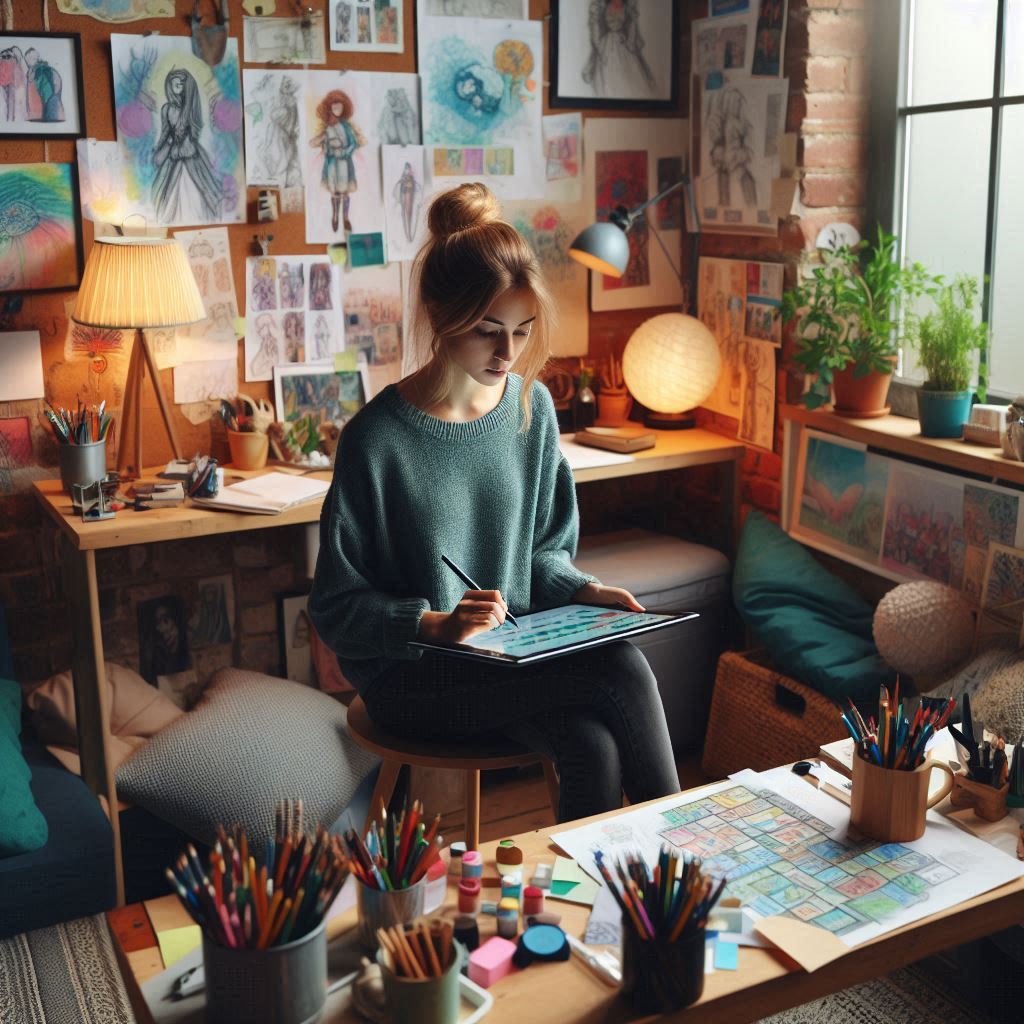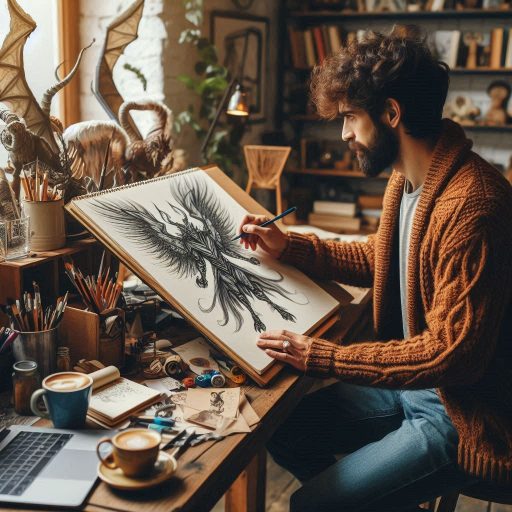Introduction
The film industry stands as a central pillar in entertainment, delivering captivating stories to audiences worldwide.
Concept artists play an essential role in this industry by shaping the visual aspects of a film‘s pre-production phase.
They help create the look and feel of characters, environments, and other key design elements, giving life to the director‘s vision before shooting begins.
Concept art is critical because it ensures that filmmakers and production teams share a cohesive vision.
Without this groundwork, many beloved film worlds, like those in science fiction and fantasy, wouldn’t exist as we know them today.
From action blockbusters to indie dramas, every project benefits from the creative touch of a concept artist.
However, breaking into the film industry as a concept artist can be challenging.
The field is competitive, with many skilled artists striving for a limited number of positions.
To succeed, aspiring concept artists need a strong portfolio that showcases their versatility and creativity.
Networking and learning from industry professionals are also vital steps toward landing that first big break.
Success in this field requires persistence, passion, and an understanding of the film production process.
Understanding the Role of a Concept Artist
Role of a concept artist in the film industry
A concept artist plays a critical role in shaping the visual aspects of a film.
Their primary job is to bring the director‘s vision to life by creating detailed sketches and designs that guide the film’s artistic direction.
Concept art serves as a blueprint, helping directors and producers visualize key scenes, characters, and settings before production begins.
Importance of concept art in visualizing the director’s vision
The importance of concept art cannot be overstated.
It is one of the first steps in the pre-production process and helps set the visual tone for the entire film.
Directors rely on concept artists to translate abstract ideas into tangible designs.
These initial visualizations allow other departments‘like costume, makeup, set design, and special effects‘to collaborate effectively.
Without concept art, directors would struggle to communicate their vision clearly, leading to potential confusion during production.
Skills and qualifications required to succeed as a concept artist in the film industry
To succeed as a concept artist in the film industry, you need a mix of technical skills and creativity.
A deep understanding of color theory, composition, and perspective is essential for creating visually compelling designs.
Mastery of digital tools, such as Adobe Photoshop, Autodesk Maya, and other 3D modeling software, is equally important.
These tools enable concept artists to create realistic designs that can be easily adapted during production.
Creativity alone is not enough, though.
Concept artists must also have strong communication skills.
They need to collaborate with directors, writers, and producers to ensure the designs meet the film‘s needs.
Concept artists should be flexible, able to modify designs based on feedback, and open to exploring different visual directions.
In terms of qualifications, a solid portfolio is more valuable than a degree.
While formal education in art or design can help, a portfolio showcasing your best work will open more doors.
Aspiring concept artists must build a portfolio showcasing versatility.
They should demonstrate an understanding of various genres.
These genres can include sci-fi, fantasy, horror, and historical drama.
Networking is another key to breaking into the industry.
Attending industry events, film festivals, and workshops helps you meet professionals who can offer guidance or job opportunities.
Build your online presence by using social media platforms like Instagram and LinkedIn.
Showcase your work and connect with other artists and filmmakers.
Passion for storytelling is crucial.
A great concept artist doesn‘t just create beautiful images; they understand how to visually enhance the narrative.
Their designs should support the film‘s themes and evoke emotions in the audience.
The best concept artists are also fans of the filmmaking process, staying up-to-date on trends and innovations in the industry.
Read: Top Skills Needed for Art Educators and Instructors
Building a Strong Portfolio
Importance of a strong portfolio in showcasing artistic abilities
A strong portfolio is essential for any concept artist aspiring to break into the film industry.
It serves as a visual resume, showcasing your artistic abilities and range of skills to potential employers.
Your portfolio is often the first impression filmmakers will have of your work, and it can determine whether you land a project or not.
A well-crafted portfolio not only highlights your technical expertise but also demonstrates your creative thinking and versatility.
Tips on how to create a diverse and impressive portfolio
When creating a portfolio, diversity is key.
Focus on showing a wide range of your abilities, from character designs to environments and props.
Ensure your work reflects your understanding of different genres, like sci-fi, fantasy, historical, and contemporary.
Tailor your portfolio to the type of films you aim to work on, but don‘t limit yourself to just one style or medium.
Including both digital and traditional sketches can show your adaptability.
Another important tip is to keep your portfolio concise and polished.
Select only your best pieces to avoid overwhelming potential employers with too much content.
Each design should tell a story and demonstrate your problem-solving ability as a concept artist.
Don‘t hesitate to include personal projects that showcase your passion and innovation.
Significance of including various styles and concepts in the portfolio to appeal to different filmmakers
Filmmakers have varying visual preferences, so including a variety of styles in your portfolio can increase your chances of landing different projects.
Versatility shows that you can adapt to different directors‘ visions and handle diverse challenges.
By incorporating a mix of highly detailed work alongside more stylized or minimalist designs, you demonstrate your creative flexibility.
In addition to diverse styles, including a variety of concepts is equally important.
Highlighting different aspects of concept art‘such as character development, world-building, and mood-setting‘can appeal to various filmmakers.
Some directors prioritize environmental designs to create immersive worlds.
Others seek intricate character concepts that align with their film’s narrative.
Your portfolio should also showcase your ability to interpret and bring to life unique and imaginative ideas.
Filmmakers often seek fresh perspectives that push the boundaries of traditional design.
Don‘t hesitate to experiment with unconventional styles and concepts that demonstrate your originality.
By doing this, you appeal to a broader range of filmmakers who value creativity and innovation in their projects.
A strong portfolio is a concept artist‘s most powerful tool for success.
By focusing on diversity in styles and concepts, you can showcase your versatility and attract the attention of a wide range of filmmakers.
Keep your portfolio polished and ensure it reflects both your technical skill and creative vision.
Read: Common Challenges Faced by Surgical Technologists
Networking and Making Connections
Importance of networking in the film industry
Networking is essential for breaking into the film industry, especially for concept artists.
In this highly competitive field, who you know can often be just as important as your artistic skills.
Building a network of contacts helps you discover upcoming projects.
It allows you to receive recommendations and access hidden opportunities.
Many opportunities may not get publicly advertised.
Networking allows you to form relationships with filmmakers, producers, and art directors who might consider you for future projects.
Transform Your Career Today
Unlock a personalized career strategy that drives real results. Get tailored advice and a roadmap designed just for you.
Start NowTips on how to build connections with filmmakers, art directors, and other industry professionals
To build meaningful connections, start by reaching out to industry professionals on platforms like LinkedIn, Instagram, or Behance, where you can showcase your work.
Engage with their posts by commenting thoughtfully on their projects, demonstrating interest in their work.
Follow up with direct messages or emails, introducing yourself and sharing your portfolio.
Keep your outreach genuine and concise, and focus on building long-term professional relationships rather than immediate job offers.
Joining online art communities and film-related forums can also help you connect with professionals.
Participate in discussions, contribute to collaborative projects, and be active in your field.
When reaching out, don‘t be afraid to ask for feedback on your work; many established professionals are open to mentoring newcomers.
Benefits of attending industry events, workshops, and conferences to expand your network
Attending industry events, workshops, and conferences is another powerful way to grow your network.
These gatherings provide an opportunity to meet filmmakers, producers, and fellow artists face-to-face.
Film festivals, such as Sundance or Cannes, and conventions like Comic-Con, often attract industry professionals and offer networking opportunities.
Participate in workshops and masterclasses led by experienced concept artists or directors.
These sessions will enhance your skills and introduce you to influential contacts in your career.
In-person interactions at events make it easier to establish rapport and make a memorable impression.
Bring business cards, and don‘t hesitate to start conversations with fellow attendees.
Ask about their projects, share your interests, and find common ground.
Networking at these events often leads to long-term collaborations and job opportunities, as it helps you stay visible and top of mind for future projects.
Networking is a critical part of building a successful career as a concept artist in the film industry.
Actively seek connections through social media and online platforms.
Attend industry events to expand your professional circle.
These actions increase your chances of landing new opportunities.
Read: Preparing for a Sonography Job Interview: Tips
Seeking Internships and Freelance Opportunities
Value of gaining practical experience through internships and freelance projects
Internships and freelance projects are valuable stepping stones for aspiring concept artists looking to break into the film industry.
They provide real-world experience, allowing you to apply your skills in professional settings.
These opportunities help you understand how the film industry operates, giving you insight into the collaboration between artists, directors, and production teams.
Internships and freelance work help you build your portfolio.
These projects showcase your ability to meet deadlines.
They also highlight your adaptability in various environments. This experience makes you more appealing to potential employers.
Tips on how to find internships and freelance opportunities in the film industry
Finding internships and freelance opportunities requires persistence and strategic searching.
Start by exploring online job boards dedicated to creative industries, such as ArtStation, Behance, and LinkedIn.
Many film studios post openings for internships or freelance projects on these platforms.
Additionally, researching smaller, independent film companies can reveal opportunities that are less competitive but still offer valuable experience.
Networking plays a crucial role in finding these opportunities.
Stay connected with professionals in the industry, and regularly check for job postings shared by your network.
Don‘t hesitate to reach out directly to film studios, art departments, or production houses with your portfolio, expressing interest in internship or freelance positions.
Often, demonstrating initiative can lead to opportunities that aren‘t publicly advertised.
Another useful tactic is collaborating on smaller indie film projects or student films.
These can provide practical experience and the chance to form relationships with up-and-coming filmmakers.
Platforms like Upwork or Freelancer can also offer freelance gigs in concept art for various projects.
Benefits of hands-on experience in honing your skills and building a reputation in the industry
Hands-on experience through internships and freelance work sharpens your artistic skills and enhances your ability to adapt to real-world challenges.
Working on film projects helps you develop problem-solving abilities.
You learn to work within constraints effectively.
Additionally, you refine your communication skills while collaborating with directors and production teams.
This practical experience is invaluable in building your reputation as a reliable and skilled concept artist.
Additionally, the experience you gain through internships and freelance work helps you build a portfolio filled with diverse and professionally completed projects.
Over time, you‘ll develop a network of colleagues and collaborators who may recommend you for larger opportunities.
Gaining practical experience also enhances your confidence, making you more prepared for full-time roles in the film industry.
Internships and freelance work provide essential hands-on experience for concept artists looking to enter the film industry.
By actively seeking out these opportunities, you can develop your skills, expand your portfolio, and build a professional reputation that will open doors to larger projects.
Read: Advancement Opportunities for Surgical Technologists

Embracing Technology and Trends
Impact of technology on concept art in the film industry
Technology has dramatically transformed concept art in the film industry, streamlining workflows and expanding creative possibilities.
Digital tools allow concept artists to create detailed, high-quality visuals more efficiently than traditional methods.
Technology has enabled artists to quickly visualize ideas, experiment with different styles, and make adjustments to meet the director’s vision.
3D modeling software, virtual reality, and AI tools have also become integral to the design process, enabling artists to create more dynamic and immersive concepts.
Importance of staying updated on the latest tools and software used by concept artists
Staying current with the latest tools and software is crucial for any concept artist looking to succeed in the film industry.
Industry-standard programs like Adobe Photoshop, Corel Painter, and Procreate are essential for 2D work.
3D software such as Blender, ZBrush, and Maya adds depth and realism to your creations.
Showcase Your Business Today
Reach thousands of readers actively exploring professional services. Publish your business profile and grow your audience now.
Publish NowNew tools, like virtual reality sketching programs (e.g., Tilt Brush), allow you to create immersive environments and characters.
By mastering these tools, you enhance your work and showcase your technical proficiency.
This proficiency is crucial in an industry that increasingly relies on digital art production.
Learning these tools through online tutorials, courses, and practice ensures that you remain competitive and efficient.
The more versatile your skill set, the better equipped you are to handle the creative demands of film projects.
Emerging trends in concept art and how they can influence your work in the film industry
Concept art trends are constantly evolving, with new styles and techniques emerging as the industry grows.
One trend is the use of photobashing, where artists combine photos with digital painting to quickly create realistic environments and characters.
This technique allows concept artists to produce highly detailed imagery in a fraction of the time.
Another growing trend is the use of 3D software to enhance 2D illustrations, blending both forms to create more complex visual concepts.
In addition to style, the rise of virtual production has had a significant impact.
Concept artists now collaborate with VFX and animation teams earlier in the production process, creating assets that transition directly into digital environments.
This requires an understanding of how digital assets move from concept art to final production.
The increasing demand for immersive content, such as augmented and virtual reality experiences, also influences concept art.
Artists must expand their thinking beyond traditional 2D visuals.
They should explore innovative methods for designing interactive environments and characters.
This approach allows audiences to engage on multiple levels.
Embracing these trends keeps your work fresh and relevant in the competitive world of film concept art.
Embracing technology and staying aware of emerging trends empowers concept artists to produce innovative and cutting-edge designs.
Staying current not only improves your creative capabilities but also ensures you remain competitive in the evolving film industry.
Showcasing Adaptability and Collaboration
Importance of being adaptable and open to feedback as a concept artist
Adaptability is crucial for concept artists in the dynamic film industry.
Projects often evolve, requiring artists to pivot their designs quickly.
A concept artist must be open to feedback to refine their concepts effectively.
Constructive criticism fosters growth and improves artistic skills.
This flexibility prepares artists for unexpected challenges during production.
Changes can come from directors, producers, or unforeseen production needs.
Artists who embrace adaptability can adjust their vision while maintaining the project‘s integrity.
This quality leads to innovative solutions and a stronger final product.
Significance of collaboration with other professionals in the film industry
Collaboration is at the heart of filmmaking.
Concept artists work alongside directors, producers, production designers, and visual effects teams to create cohesive visuals.
Each professional brings unique insights and expertise that enrich the artistic process.
For instance, production designers offer practical insights into what is feasible for set construction.
Directors provide creative vision, ensuring that the concept aligns with the story‘s themes.
Collaborative efforts help ensure that the concept art meshes well with the film‘s overall vision and aesthetic.
Building strong relationships within the team fosters a productive environment, leading to more innovative ideas and solutions.
Tips on how to effectively communicate and collaborate with directors, producers, and fellow artists
Effective communication is vital for successful collaboration in the film industry.
Establish clear communication by using concise language to articulate your ideas.
Listen actively to others and ask questions to clarify expectations.
Set regular check-ins to discuss progress and address concerns, which keeps everyone on the same page.
Being receptive to input is important; approach feedback with an open mind and consider how different perspectives might enhance your work.
Share your artistic process and the reasoning behind your designs to foster trust and understanding within the team.
Building relationships with colleagues enhances teamwork and creates a positive atmosphere conducive to creativity.
Embrace compromise and be willing to adjust your ideas while staying true to your vision.
This often involves finding a middle ground that satisfies everyone involved.
Practice active listening to pay attention to others‘ ideas and suggestions, making them feel valued and respected.
Using visual aids can also help bridge communication gaps when discussing concepts.
By showcasing adaptability and fostering collaboration, concept artists can thrive in the film industry.
These skills enhance personal growth and contribute to creating remarkable films that resonate with audiences.
Embracing teamwork and flexibility opens doors to new opportunities and enriches the creative process, resulting in innovative cinematic experiences.
Find Out More: Packaging Design Trends to Watch in 2024
Persistence and Resilience in the Face of Rejection
Reality of Facing Rejection and Challenges in Breaking into the Film Industry
Rejection is an inevitable part of breaking into the film industry as a concept artist.
Many artists face countless challenges before securing their first opportunity.
The competition is fierce, with many talented individuals vying for limited roles.
Even the most skilled artists can receive multiple rejections.
This can be disheartening and lead to self-doubt.
However, it is crucial to understand that rejection does not define your worth or talent.
Instead, it is a natural part of the creative process.
Acknowledging this reality allows artists to build resilience and develop a thicker skin.
Embracing the idea that each rejection is a stepping stone can help maintain motivation in pursuing your passion.
Strategies for Staying Motivated and Resilient in Pursuing Your Dreams as a Concept Artist
Staying motivated in the face of rejection requires a proactive mindset.
Set specific, achievable goals that keep you focused on your artistic journey.
Breaking larger goals into smaller tasks can create a sense of accomplishment and progress.
Surround yourself with a supportive network of fellow artists who share similar aspirations.
Engaging with peers provides encouragement during tough times and can help you stay accountable.
Incorporate regular practice and skill development into your routine.
Engaging in personal projects allows for creative expression and can reignite your passion for concept art.
Additionally, seek constructive feedback from trusted sources.
Use rejection as an opportunity to evaluate your work and identify areas for improvement.
Celebrate small victories along the way, as they contribute to your growth as an artist.
Success Stories of Artists Who Overcame Setbacks and Achieved Their Goals in the Industry
Numerous successful concept artists have faced rejection before achieving their dreams.
For instance, a renowned artist struggled for years to secure a job in the film industry.
After enduring numerous rejections, they committed to refining their skills and building a diverse portfolio.
Their persistence ultimately led to recognition by a major studio.
Another inspiring example is an artist who faced relentless critiques of their work.
Instead of succumbing to discouragement, they used feedback to enhance their designs.
This dedication and resilience eventually landed them a role on a high-profile film project.
These stories illustrate the importance of perseverance in overcoming setbacks.
They highlight that resilience can turn challenges into opportunities for growth.
Aspiring concept artists can learn from these experiences.
The journey to success may be fraught with obstacles, but maintaining determination and adaptability is crucial.
Embrace rejection as part of the creative process.
Let setbacks fuel your passion for becoming a successful concept artist in the film industry.
Remember that persistence and resilience are key to navigating the challenges you may face.
Find Out More: Pros and Cons of Being a Web Designer
Uncover the Details: Creating User-Friendly Websites: Best Practices
Conclusion
In this blog, we‘ve discussed the crucial role concept artists play in the film industry and the challenges they face.
Concept artists bring stories to life, creating visual foundations during the pre-production phase of filmmaking.
Despite the intense competition, success is achievable with persistence, a strong portfolio, and meaningful industry connections.
Aspiring concept artists should stay dedicated to their passion.
Breaking into the industry takes time, but perseverance and continual improvement will bring you closer to your goals.
Keep practicing, stay updated on industry trends, and always look for ways to showcase your unique style.
For those aiming to enter the film industry as concept artists, resilience is essential.
Success comes from continuous learning and adaptability.
Seek out opportunities to network, collaborate, and refine your craft.
Even in a competitive field, your dedication and passion can help you stand out.
While the journey to becoming a concept artist in the film industry may be challenging, it is incredibly rewarding.
With hard work and a clear vision, you can turn your artistic dreams into reality.
Stay motivated, remain patient, and pursue your creative ambitions.
[E-Books for Sale]
The Big Book of 500 High-Paying Jobs in America: Unlock Your Earning Potential
$19.99 • 500 High-Paying Jobs • 330 pages
Explore 500 high-paying jobs in America and learn how to boost your career, earn more, and achieve success!
See All 500 High-Paying Jobs of this E-Book
1001 Professions Without a Degree: High-Paying American Jobs You Can Start Now
$19.99 • 1001 Professions Without a Degree • 174 pages
Discover 1001 high-paying jobs without a degree! Unlock career tips, skills, and success strategies for just $19.99!




